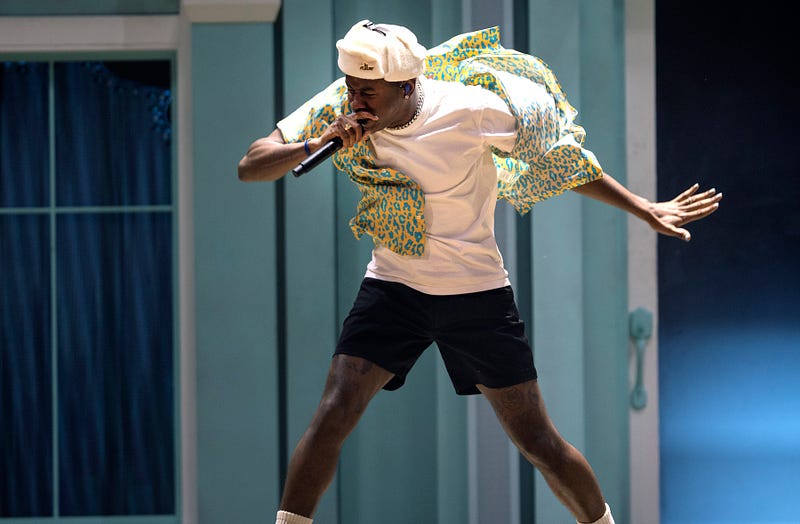
CALL ME IF YOU GET LOST
won him his 2nd Grammy for Best Rap Album. Photo courtesy of Star Tribune.
Tyler, the Creator is a man who does not need introduction for most. He is flamboyant, polarizing and one of the more stylistically distinct artists of the 2010s and beyond. His musical persona is a caricature of his own personal tendencies, and this has been made clear by the overt attempts at separating each studio album of his into different eras of his career. There was
Goblin
(2011), a debut that was unpolished and abrasive in its production and lyricism. Then came
Wolf
(2013), which saw a greater attempt at refining the sonic attributes of his work but still remained lyrically raw while he struggled to find flows and a true voice. None of this was improved upon on
Cherry Bomb
(2015), arguably his most divisive project that had tracks ranging from unintelligible distortion to R&B ballads. His 4th LP,
Flower Boy
(2017), marked a deliberate realization in his career: it was time to get serious. Touching on intimate aspects of his personal life, such as his sexuality and social anxiety, fans received the first taste of Tyler’s most vulnerable self, not an act that was trying to look cool for the now-grown teenagers that sparked his career in the early days of his former musical collective Odd Future. Subsequently,
IGOR
(2019) was the creative fever pitch in Tyler’s career that earned him his first Grammy and unprecedented critical acclaim. Tyler has carved out a dynamic lane for himself that is only defined by whatever creative aspirations he embarks upon, as evident by 2021’s
CALL ME IF YOU GET LOST
, which was Tyler’s purest “rap” album to date. Instead of becoming complacent in his approach to music, Tyler continues to evolve and has now released his first deluxe attachment to an album:
CALL ME IF YOU GET LOST: The Estate Sale
(2023).
This may seem simply like a career retrospective of Tyler’s endeavors so far, and that is intentionally aligned with the theme of the deluxe album’s most lyrically dense track “SORRY NOT SORRY.” The nuances of this track are encapsulated by the fact that it is currently trending at the top of the leaderboards for the lyric database application
GENIUS
. The song, with a refreshing and smooth delivery on top of a soulful instrumental, touches on every aspect of his career that has been mentioned; all of the drama, personal struggles and public presentations of himself as an artist. Referring back to Tyler’s struggle with his own sexuality,
Flower Boy
saw him suggesting that he is potentially bisexual and “SORRY NOT SORRY” cleverly reaffirms this theory when he raps, “Sorry to the guys I had to hide (Ooh)/Sorry to the girls I had to lie to/Who ain’t need to know if I was by the lake switchin’ tides, too.” The lyrics are direct on the surface, but the word “by” in “by the lake” is delivered in a fashion that emphasizes the singular adverb in a way that may be a shortened indication of bisexuality. At other moments, he apologizes for the dissolution of his Odd Future group that featured prominent musical figures like Earl Sweatshirt and Frank Ocean by assuming the blame of letting ego take hold of their creative mission as a collective. The song ends with a swelling confrontation with those who reject Tyler’s rag to riches story because of his quirky persona by spitting bars like “Let me see you make a decision I made/And claim that I don’t know about minimum wage or Section 8.” Tyler has an affinity of never pandering with his verbiage, but his visual work occasionally speaks louder than his words and this continues to apply to “SORRY NOT SORRY.”
The music video for “SORRY NOT SORRY” displays a theatrical performance starring all of Tyler’s various musical eras, whether it’s the eccentric color-blocked designer-wear of the
IGOR
period or the bike-riding and streetwear-donning span that
Wolf
embodied. The camera pans and focuses on each of these characters that are simultaneously performing the song based on which lyrics apply to which identity for dramatic effect until the video’s conclusion of each character being erased by Tyler’s current era: being himself. It seems as though the video is a statement that Tyler is done with disguising himself for art’s sake and is ready to be his most authentic self, and that’s a change that his audience will surely welcome.
















